Did you know that Egypt is called the graveyard of invaders? Yes, since it is one of the most valuable countries in the world, all major powers throughout history have looked at Egypt as a treasure to possess and a demonstration of hegemony. Egypt’s geography—the Nile Valley, fertile delta, and crossroads between Africa, Asia, and the Mediterranean—made it a prize for empires across history. Yet, despite repeated invasions, Egyptian culture proved remarkably resilient, absorbing influences while maintaining its identity. This long history of resilience meant that many foreign powers were eventually expelled or assimilated into Egyptian culture.
This enduring resilience is best understood by looking at the long line of powers that tried—and often failed—to dominate Egypt. From ancient empires to modern states, each left its mark, yet none could erase Egypt’s identity. The following list traces some of the most significant invaders and occupiers across history, showing how Egypt became known as the graveyard of invaders.

Hyksos (c. 1650–1550 BCE): Semitic rulers from the Levant who took control during Egypt’s Second Intermediate Period.
Assyrians (7th century BCE): Under kings Esarhaddon and Ashurbanipal, they briefly conquered Egypt.
Persians (525–404 BCE, 343–332 BCE): Egypt was twice absorbed into the Achaemenid Persian Empire.
Greeks (332 BCE): Alexander the Great conquered Egypt, founding the Ptolemaic dynasty.
Romans (30 BCE): After Cleopatra VII’s death, Egypt became a Roman province.
Byzantines (395 CE onward): Egypt remained under Eastern Roman (Byzantine) control until the Arab conquest.
Arabs (639–642 CE): Muslim armies under Amr ibn al-As conquered Egypt, integrating it into the Rashidun Caliphate.
Crusaders (12th–13th centuries): Multiple attempts, including the Siege of Damietta (1218–1221), but Egypt resisted.
Mongols (13th century): Tried to push into Egypt but were defeated by the Mamluks at Ain Jalut (1260).
Ottomans (1517): Sultan Selim I conquered Egypt, making it an Ottoman province.
French (1798–1801): Napoleon’s expedition briefly occupied Egypt before being expelled by the British and Ottomans.
British (1882–1952): Britain occupied Egypt after the Urabi Revolt, maintaining control until the 1952 revolution.
Israel (1956, 1967, 1973): In the modern Arab-Israeli conflicts, Israel invaded or occupied parts of Sinai, though Egypt later regained it.
Did you hear about Buhen Fortress before?
Discover the story of Buhen Fortress in this YouTube documentary, which explores one of Egypt’s greatest strongholds.
You can find a detailed list of all the wars Egypt has been involved in on Wikipedia. However, much of this record is influenced by a European and Western outlook, which at times presents a misleading picture—particularly when it comes to Egypt’s history after Islam became part of Egypt’s story.
While exploring this topic, you may also come across online answers — for example, on Quora — that claim Islam “ruined” Egyptian culture. One such response, written by an Egyptian Christian, unfortunately relies on unverified claims, lacks credible sources, and even quotes a major scholar out of context in a way that misleads readers. This highlights an important reminder: not every opinion online reflects historical accuracy. Egypt’s history is too rich and complex to be reduced to polemics. The Islamic period, like others before it, was not a rupture that erased Egyptian identity but rather a continuation of Egypt’s long tradition of resilience — absorbing influences while maintaining its cultural core.
Interestingly, Quora’s recommendation system highlighted Milad Sidky’s weakly sourced answer, while ignoring Anthony M. Anderson’s response — even though Anderson’s contribution received more than triple the upvotes, replies, and reposts. This shows how platform algorithms don’t always reflect the quality or credibility of content, but instead surface answers for reasons that may not align with historical accuracy. For a more balanced and well-documented perspective, it’s better to consult scholarly and primary sources such as Dar al-Ifta’s Introduction to Islamic History or fact-based analyses like the Pulitzer Center – Egypt’s Religious Roots of Conflict”
From 642 CE until today, Egypt has been directly and indirectly involved in numerous wars, shaping both regional and global history. For a visual overview, you can explore this YouTube playlist, which highlights many of the conflicts Egypt took part in.
Yet Egypt’s story is not defined by conflict alone. The very resilience that allowed it to withstand centuries of invasions is also what preserved its monuments, temples, and cultural landmarks. Today, these sites stand as living witnesses to Egypt’s layered history—places where visitors can walk through the legacies of pharaohs, conquerors, and dynasties alike.

- Browse Egypt’s Monuments and explore 70+ historic locations across the country.
- Discover Archaeological Sites from the Predynastic era to the Muhammad Ali Dynasty.
- Trace Egypt’s past with the History Tree and follow the rise and fall of its dynasties.